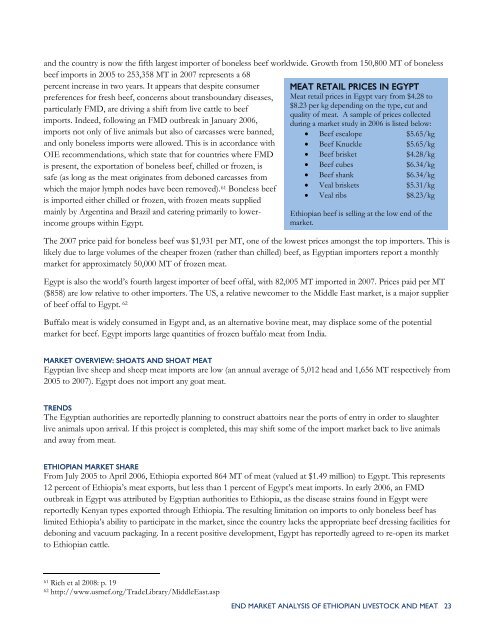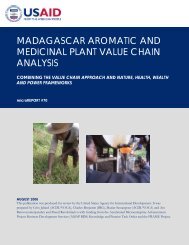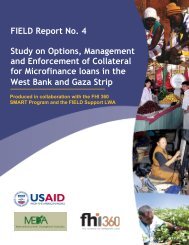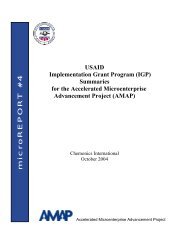End Market Analysis of Ethiopian Livestock and ... - USAID Microlinks
End Market Analysis of Ethiopian Livestock and ... - USAID Microlinks
End Market Analysis of Ethiopian Livestock and ... - USAID Microlinks
Create successful ePaper yourself
Turn your PDF publications into a flip-book with our unique Google optimized e-Paper software.
<strong>and</strong> the country is now the fifth largest importer <strong>of</strong> boneless beef worldwide. Growth from 150,800 MT <strong>of</strong> boneless<br />
beef imports in 2005 to 253,358 MT in 2007 represents a 68<br />
percent increase in two years. It appears that despite consumer<br />
preferences for fresh beef, concerns about transboundary diseases,<br />
particularly FMD, are driving a shift from live cattle to beef<br />
imports. Indeed, following an FMD outbreak in January 2006,<br />
imports not only <strong>of</strong> live animals but also <strong>of</strong> carcasses were banned,<br />
<strong>and</strong> only boneless imports were allowed. This is in accordance with<br />
OIE recommendations, which state that for countries where FMD<br />
is present, the exportation <strong>of</strong> boneless beef, chilled or frozen, is<br />
safe (as long as the meat originates from deboned carcasses from<br />
which the major lymph nodes have been removed). 61 Boneless beef<br />
is imported either chilled or frozen, with frozen meats supplied<br />
mainly by Argentina <strong>and</strong> Brazil <strong>and</strong> catering primarily to lowerincome<br />
groups within Egypt.<br />
The 2007 price paid for boneless beef was $1,931 per MT, one <strong>of</strong> the lowest prices amongst the top importers. This is<br />
likely due to large volumes <strong>of</strong> the cheaper frozen (rather than chilled) beef, as Egyptian importers report a monthly<br />
market for approximately 50,000 MT <strong>of</strong> frozen meat.<br />
Egypt is also the world’s fourth largest importer <strong>of</strong> beef <strong>of</strong>fal, with 82,005 MT imported in 2007. Prices paid per MT<br />
($858) are low relative to other importers. The US, a relative newcomer to the Middle East market, is a major supplier<br />
<strong>of</strong> beef <strong>of</strong>fal to Egypt. 62<br />
Buffalo meat is widely consumed in Egypt <strong>and</strong>, as an alternative bovine meat, may displace some <strong>of</strong> the potential<br />
market for beef. Egypt imports large quantities <strong>of</strong> frozen buffalo meat from India.<br />
MARKET OVERVIEW: SHOATS AND SHOAT MEAT<br />
Egyptian live sheep <strong>and</strong> sheep meat imports are low (an annual average <strong>of</strong> 5,012 head <strong>and</strong> 1,656 MT respectively from<br />
2005 to 2007). Egypt does not import any goat meat.<br />
TRENDS<br />
The Egyptian authorities are reportedly planning to construct abattoirs near the ports <strong>of</strong> entry in order to slaughter<br />
live animals upon arrival. If this project is completed, this may shift some <strong>of</strong> the import market back to live animals<br />
<strong>and</strong> away from meat.<br />
ETHIOPIAN MARKET SHARE<br />
From July 2005 to April 2006, Ethiopia exported 864 MT <strong>of</strong> meat (valued at $1.49 million) to Egypt. This represents<br />
12 percent <strong>of</strong> Ethiopia’s meat exports, but less than 1 percent <strong>of</strong> Egypt’s meat imports. In early 2006, an FMD<br />
outbreak in Egypt was attributed by Egyptian authorities to Ethiopia, as the disease strains found in Egypt were<br />
reportedly Kenyan types exported through Ethiopia. The resulting limitation on imports to only boneless beef has<br />
limited Ethiopia’s ability to participate in the market, since the country lacks the appropriate beef dressing facilities for<br />
deboning <strong>and</strong> vacuum packaging. In a recent positive development, Egypt has reportedly agreed to re-open its market<br />
to <strong>Ethiopian</strong> cattle.<br />
61 Rich et al 2008: p. 19<br />
62 http://www.usmef.org/TradeLibrary/MiddleEast.asp<br />
MEAT RETAIL PRICES IN EGYPT<br />
Meat retail prices in Egypt vary from $4.28 to<br />
$8.23 per kg depending on the type, cut <strong>and</strong><br />
quality <strong>of</strong> meat. A sample <strong>of</strong> prices collected<br />
during a market study in 2006 is listed below:<br />
• Beef escalope $5.65/kg<br />
• Beef Knuckle $5.65/kg<br />
• Beef brisket $4.28/kg<br />
• Beef cubes $6.34/kg<br />
• Beef shank $6.34/kg<br />
• Veal briskets $5.31/kg<br />
• Veal ribs $8.23/kg<br />
<strong>Ethiopian</strong> beef is selling at the low end <strong>of</strong> the<br />
market.<br />
END MARKET ANALYSIS OF ETHIOPIAN LIVESTOCK AND MEAT 23





